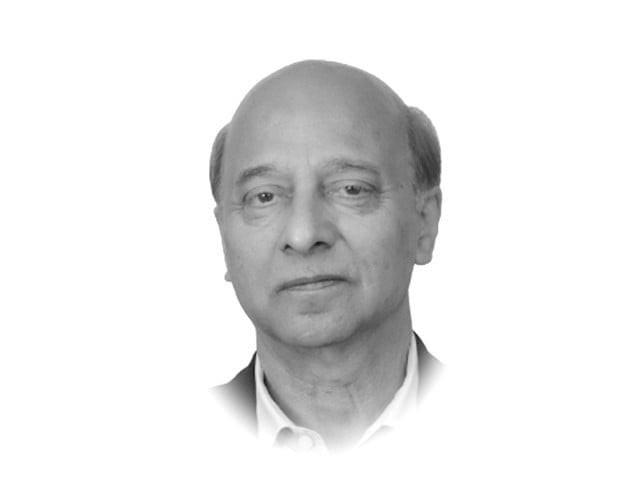India's new normal and Pakistan's challenges
Modi's tweet a few hours after his speech clearly conveyed a sense of indignation, if not humiliation.

From the United States to South Asia, we currently reside in a state of neo-normalcy, primarily characterised by the impulsive actions of Donald Trump and the seemingly arrogant conduct of Narendra Modi, driven by the Hindutva ideology. In his address to the nation on May 12, Prime Minister Modi made several critical remarks, including the reference to a neo-normal. The challenges that lie ahead warrant a comprehensive analysis of the current situation.
First, Modi's tweet a few hours after his speech clearly conveyed a sense of indignation, if not humiliation.
"To those who feel slightly dejected at their scores, I want to assure them: one examination cannot define your worth. Your journey is far more extensive, and your strengths extend beyond the mark sheet. Maintain confidence and curiosity, for great opportunities await..."
Under the influence of the 2+2 Dialogue (involving Indian and US Foreign and Defense Ministers) and the Quad partnership, Modi also appropriated a phrase from a speech George W Bush delivered immediately following the 9/11 attacks: we will not differentiate between the government that sponsors terrorism and the masterminds of terrorism. Modi reminded us of the Bush vow: We will make no distinction between the terrorists who committed these acts and those who harbor them.
Second, Prime Minister Modi's assertion that he would not distinguish between "terrorist groups and governments that support them" came across as excessively self-righteous, reminiscent of the Israeli high-handedness towards Palestinians and Hamas. Despite the fact that the burden of proof for the Pahalgam operation rests solely with New Delhi, the Indian leadership behaved in a manner similar to that of the United States (compared to smaller, non-aligned countries) or the Israelis (vis a vis Palestinians) in violation of Pakistan's sovereignty.
Third, Modi referred to the Operation Sindoor as a new parameter and a new normal, asserting that it demonstrated India's superiority in contemporary warfare. However, it is important to note that the operation has been suspended, and its future will depend on the behaviour of the concerned parties.
Fourth, the May 7 strikes and the drone incursions established a "new normal" i.e. the ever-present possibility and unfortunate reality of a limited conflict under a nuclear overhang. Indians were able to successfully carry out military strikes deep into Pakistani territory, an action unthinkable until now.
Fifth, undoubtedly blinded by the US-led patronage and pampering until the exit of President Joe Biden, Modi and his aides simply forgot that India is not Israel, nor is Pakistan Hamas, Palestine or Nepal. Palestinians are politically orphans, owned by none globally. Pakistan, on the other hand, is a nuclear-armed power that enjoys unmistakable solidarity with China.
Sixth, the Indian aggression likely stemmed from an erroneous assumption that following the 22 deaths of Chinese nationals since 2017, China and Pakistan had drifted apart. Tactical differences on general security and Chinese displeasure over non-adherence to the agreed standard operating procedures for the protection of Chinese nationals linked to CPEC projects had created a perception of a dysfunctional Sino-Pak relationship.
Most people, both observers and commoners, nevertheless, lost track of the strategic cooperation and coordination that had only been progressing slowly and silently. In the maze of this perception, the Indian strategic community simply overlooked the depth of the China-Pakistan strategic partnership. Events between May 7 and 10 shattered that perception and triggered a global shockwave as well as a strategic rethink.
Now that Pakistan managed to a) survive the "new normal" and Trump's intervention partially blunted India's narrative, b) Pakistan's narrative did find some resonance globally, and c) China made its "presence" felt with a bang, multiple challenges stare Islamabad and Rawalpindi in the face.
First and foremost, let us not lose sight of the current internal political and economic struggles, encapsulated by the influential weekly The Economist. It describes the country as "decaying" with an economy in crisis.
'As Pakistan experiences economic decline, India emerges as a rising power ... Its GDP has grown tenfold compared to its neighbours, having been five times larger in 2000,' noted The Economist in its May 10 edition.
Well-intentioned friends in Beijing shared similar cautions in their messages. One friend advised, "A bruised India will not relinquish its resolve and will continue to provoke. However, Pakistan should remain confident that India is not the sole authority in the region."
The latest round of conflict presents Pakistan with an opportunity to target non-state actors without discrimination or distinction. A Beijing-based analyst stated, "Pakistan's lagging progress stems from its misguided approach to fighting and using terrorism, including the distinction between 'good' and 'bad' Taliban. If this approach cannot be rectified, Pakistan will never achieve peace. India will continue to label Pakistan as a terrorist state, and even the United States and the West will lose respect for Pakistan."
Another Chinese analyst emphasised that while Pakistan can continue to rely on China as a steadfast ally, it must take proactive steps to attract foreign investment and address its economic challenges. Self-reliance through economic growth is the key, she asserted.
The messaging from our Chinese and Turkish friends should serve as a catalyst for a long-overdue review, reform and resolution to extricate Pakistan from its governance and economic crisis.
Modi's intimidatory tone and tenor foretells an intense psychological warfare campaign involving the dissemination of fabricated and distorted news, as well as manipulated narratives. Terrorist organisations such as the TTP, BLA and BLF are likely preparing to escalate violence across the country. Complacency is no option.















COMMENTS (1)
Comments are moderated and generally will be posted if they are on-topic and not abusive.
For more information, please see our Comments FAQ